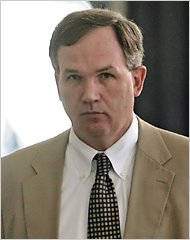Is Special Prosecutor Patrick Fitzgerald Guilty of Obstruction of Justice?

The article published September 2, 2006 in the New York Times is entitled "New Questions About Inquiry in C.I.A. Leak," but it reveals some startling new facts concerning the investigation conducted by Special Prosecutor Patrick J. Fitzgerald. One might normally question the accuracy of any New York Times story on Plamegate, but this Times' story is an admission against interest from a hostile witness--hostile, that is, to the Bush Administration--and therefore has substantial credibility.
Among the revelations in the Times article:
1. Richard Armitage first disclosed Valerie Plame's CIA affiliation to Bob Woodward on June 13, 2003, making Woodward the first reporter to learn of Ms. Plame's CIA connection. That disclosure occurred weeks before the New York Times published the opinion piece by Ms. Plame's husband, Joseph C. Wilson IV, that supposedly triggered Ms. Plame's outing by a vengeful White House. Woodward and other journalists were at that time pursuing a story about Administration efforts to verify an Iraqi deal to obtain uranium from Niger
2. On July 8, 2003, two days after the publication of Mr. Wilson's column in the New York Times, at the conclusion of a general foreign policy discussion with Robert Novak, Mr. Armitage said in reply to a question that Ms. Wilson might have had a role in arranging her husband’s trip to Niger. The Times article states that "those aware of his actions" say that Mr. Armitage did not know of Ms. Plame's undercover status and may not have even used her name (apparently referring to her as Mr. Wilson's wife).
3. On July 14, Mr. Novak published his column, revealing Ms. Plame's role in arranging for her husband to make the Niger investigation trip, and her CIA status.
4. On October 1, 2003, in response to rampant speculation that the leaker of Ms. Plame's CIA affiliation was Karl Rove or someone working for him, Robert Novak revealed in a column that the source of the leak was "no partisan gunslinger." According to Mr. Armitage, he first realized that he was the source of the leak when he read Mr. Novak's October 1 column. Before the month was out, Mr. Armitage had revealed to the Justice Department that he was the source of the leak regarding Ms. Plame.
4. In December 2003, Mr. Fitzgerald was named as special prosecutor, with the charge of investigating whether whether the leaking of Ms. Wilson’s identity as a C.I.A. officer was part of an administration effort to violate the law prohibiting the willful disclosure of undercover employees. On his first day on the job, Mr. Fitzgerald was informed that Mr. Armitage was the souce of the leak to Robert Novak! He presumably also was made privy to Mr. Armitage's confession to the Justice Department, and therefore also knew that Mr. Armitage had not acted at the behest of the Bush Administration in general, or Karl Rove or Scooter Libby in particular.
The conclusion seems inescapable that Mr. Fitzgerald knew the anwser to the primary question that he was charged with investigating from the time he began his inquiry. Nonetheless, he maneuvered Vice Presidential Chief of Staff I. Lewis "Scooter" Libby into legal jeopardy. In the words of the New York Times article:
Mr. Fitzgerald’s decision to prolong the inquiry once he took over as special prosecutor in December 2003 had significant political and legal consequences. The inquiry seriously embarrassed and distracted the Bush White House for nearly two years and resulted in five felony charges against Mr. Libby, even as Mr. Fitzgerald decided not to charge Mr. Armitage or anyone else with crimes related to the leak itself.
Moreover, Mr. Fitzgerald’s effort to find out who besides Mr. Armitage had spoken to reporters provoked a fierce battle over whether reporters could withhold the identities of their sources from prosecutors and resulted in one reporter, Judith Miller, then of The New York Times, spending 85 days in jail before agreeing to testify to a grand jury.
According to the American Bar Association Standards of Criminal Justice, Standard 3-1.2 The Function of the Prosecutor, "The duty of the prosecutor is to seek justice, not merely to convict." What duty was Special Prosecutor Fitzgerald pursuing when he ruined the lives and careers of a dedicated public servant (Mr. Libby) and a Pulitzer Prize winning report (Ms. Miller)? It is ironic that Mr. Fitzgerald indicted Mr. Libby for, among other charges, obstruction of justice. Obstruction of justice and perversion of justice are precisely the charges for which I would indict Mr. Fitzgerald, ethically, if not legally.
Lowell adds: One wonders if Mr. Fizgerald, the hunter, will now become the hunted-- at least to some extent. In any event, he owes the nation an explanation.





3 Comments:
You're the only blogger other than myself (that I've seen, anyway) who's written that FitzGerald seems guilty of something here. Why isn't this prosecurtorial misconduct as well as obstruction of justice????
Posted by anne
Just wondering if Mr. Fitzgerald will now go after the Times reporters who he was charged with investigating for tipping off the enemy?
Does anyone feel like they just witnessed another O.J. verdict?
Post a Comment
<< Home